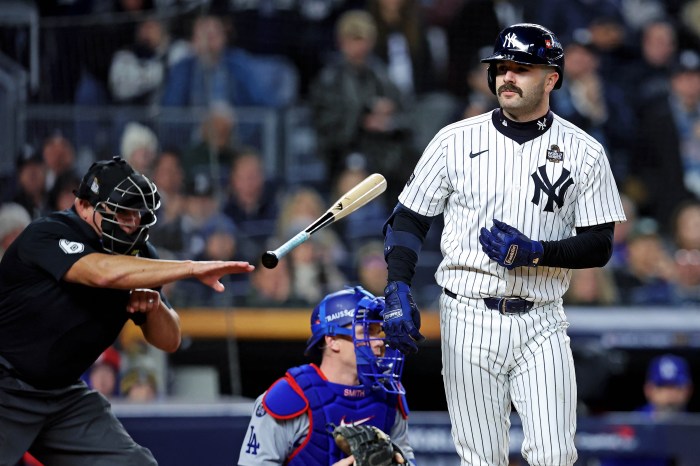Kristaps Porzingis went from being the cornerstone of the New York Knicks’ future to little more than a footnote in franchise history, all in the span of a New York minute.
Now that fans have had time to process Porzingis’ trade to the Dallas Mavericks, which shook the NBA world to a degree measurable on the Richter Scale, it’s easier to see how the move positions the Knicks to lure superstars to the city. In dealing Porzingis, Tim Hardaway Jr., Courtney Lee and Trey Burke to Dallas for Dennis Smith Jr., DeAndre Jordan, Wesley Matthews and first-round picks in 2021 and 2023, the Knicks cleared enough future payroll obligations to afford two max-contract superstars this summer.
It’s unlikely the Knicks would make much of a play on some of the top-tier restricted free agents on July 1, when free-agent negotiations are allowed to begin. Instead, they’re likely to focus on the upper crust of the unrestricted free-agent market. That group is headlined by Kevin Durant, Kyrie Irving, Jimmy Butler, Kawhi Leonard, Kemba Walker and Klay Thompson. Early projections indicate Durant’s max contract would have a starting salary of $38.15 million in 2019-20, while the others would start at an estimated $32.7 million.
The influx of assets from the Porzingis trade does give the Knicks more options in the trade market, as another means of acquiring a superstar. Anthony Davis’ agent made it known last month that the New Orleans Pelicans’ big man wants out of the Big Easy. ESPN’s Adrian Wojnarowski reported Monday that the Knicks are a team Davis would consider re-signing with long-term, after he hits the free agent market in 2020, should he be traded there.
If the Knicks do sign two max players this summer, they’re basically disqualified from signing Davis as a free agent in the 2020 offseason. To get him, they would need to trade for him. That could happen as soon as this week, before Thursday’s 3 p.m. NBA trade deadline. However, it likely means the Knicks packaging as many players who are still on the payroll after this season as possible. That group is comprised of Lance Thomas, Frank Ntilikina, Dennis Smith Jr., Kevin Knox, Mitchell Robinson and Damyean Dotson.
All but Thomas are in their first or second NBA season, with Knox and Smith the most valuable trade chips. Smith, however, cannot be included in a multiplayer deal before Thursday because he was just traded last week. Knicks president Steve Mills and general manager Scott Perry would have to hope a deal centered on Knox and several first-round picks — their own and/or the Mavs’ — is more enticing to New Orleans than anything offered by the Los Angeles Lakers, the current leaders in the sweepstakes by most media reports, or another surprise team.
In theory, the Knicks could try again to work out a trade in June or July, but by that point the Boston Celtics would become the expected front-runners to put together an impressive trade package for Davis. Because of a complex provision in the NBA collective bargaining agreement known as the Rose Rule (for former Knicks point guard Derrick Rose), Davis and Irving cannot be on the Celtics’ roster until Irving’s current contract expires. That’s no longer an issue come summertime.
The likelihood of the Knicks somehow trotting out an October starting lineup featuring Davis and any two of the aforementioned free agents is microscopic, but it’s possible. It’s more likely they’ll lure a combination of two of those seven stars, with Durant, Irving, Butler and Walker the most probable. Of course, the Knicks could just as easily be shunned by all of the above and miss out on dealing for Davis. Top free agents have ignored the franchise in the recent past.
Even if they whiff on the top unrestricted free agents, the Knicks’ dismal season has them in the running for the No. 1 overall pick in this year’s NBA Draft. They currently own the league’s worst record at 10-42, giving them a 40.1 percent chance at a top-three pick if they finish the season at the bottom of the NBA. For the first time this year, each of the three worst teams has a 14 percent likelihood of securing the top pick instead of 25 percent for the worst team and declining odds for each of the next-worst teams. Duke freshman Zion Williamson is considered a generational talent and the consensus best player available, but Blue Devils teammate R.J. Barrett is regarded as a great consolation prize for lottery teams. Either should excite the fan base.
If the Knicks enter July with Knox, Smith and either Williamson or Barrett, they’ll have a strong young core that could be enough to attract a second-tier unrestricted free agent to join them on a sub-max deal. That group includes DeMarcus Cousins, Tobias Harris, Khris Middleton and Nikola Vucevic. Giving any of them a full max contract would be much riskier, though.
With so many possibilities ahead for the Knicks right now, the action off the court over the next five months figures to be way more exciting than the on-court product at Madison Square Garden. Time will tell if they wind up winners in the long-term.




































